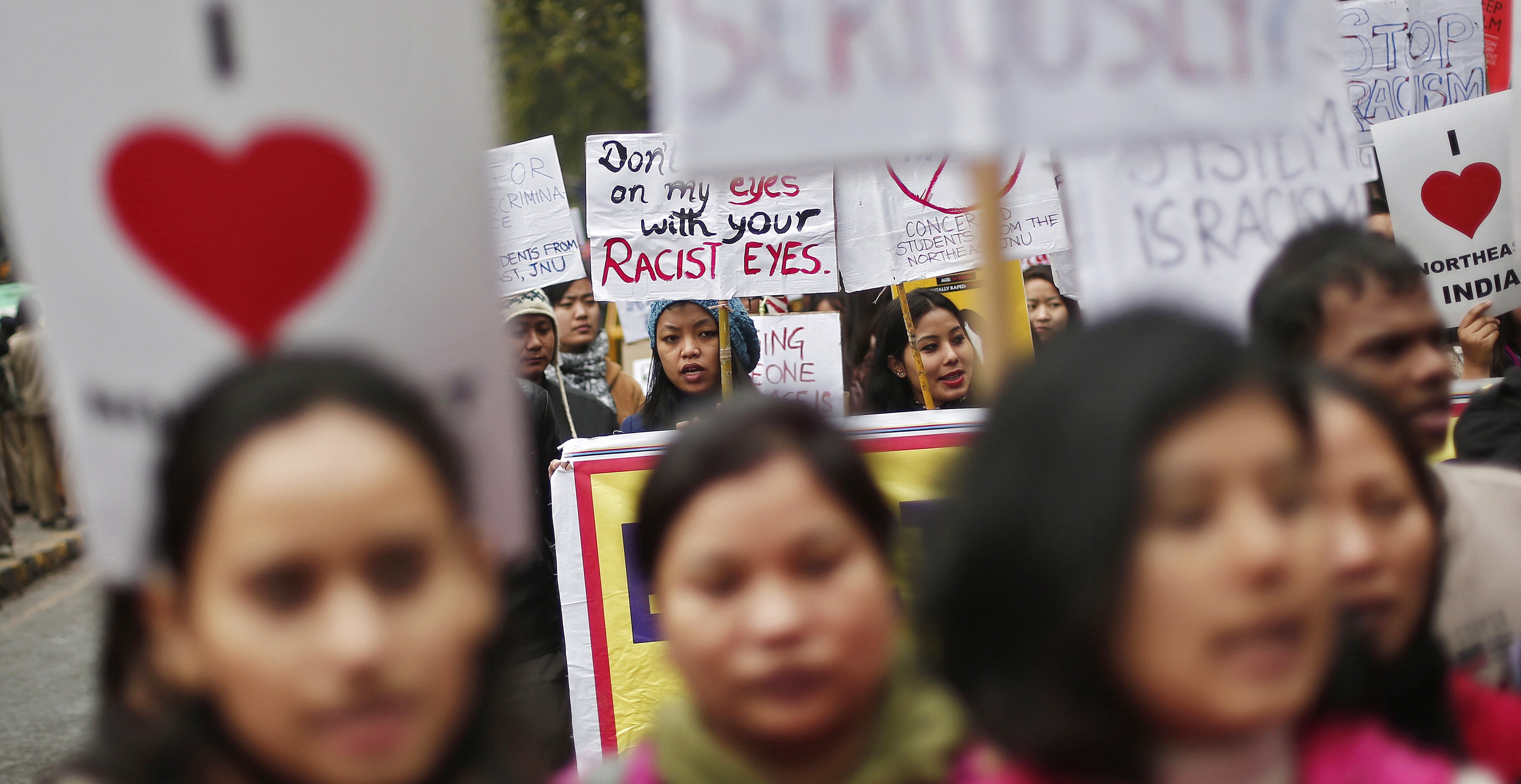As a person belonging to the Northeast of India, the inevitable state of having two identities is imbibed in us the moment we realise the very existence of our identity in India. The major realisation of our two conflicting, yet unique identities, comes full circle when we start living in spaces where our voices occupy a lower floor inside the tall hierarchal building that is Indian society.
This has forcefully pushed us into a black hole of psychological dilemma. On one hand, we are constantly trying to fit inside this hollow mould, which is walled with ignorance and mainland conformity, in order to prove our ‘Indian-ness’. On the other hand, we are pigeonholed into racist stereotypes and subjected to countless prejudices by the same majority who crafted that mould.
Our invisibility in mass media and major policy formation has further intensified our problems as we search for our single identity as an Indian citizen devoid of societal labels and racial differences. As a matter of fact, there is a continuous battle being fought inside our minds between our two identities.
Also read: ‘You are Coronavirus’: Students From Northeast India Face Bigotry Over Pandemic
Sadly, in this fruitless battle for the search of our just and singular identity, there is no winner but only a lost indefinable identity positioning itself as a tightrope walker carefully walking on a thin rope of societal acceptance as it balances the two identity poles located at each end of the stick with the added fear of slipping and falling deep into the dark abysmal heap of disparity where all lost identities go to die.
Our society’s problematic approach in labelling group definitions against its own powerless citizens has stigmatised our whole identity as a Northeastern Indian. Furthermore, this utopian thought of our existence being included in the mainland normative is hard to fathom considering the mass systematic racism functioning in our society which is there to check and filter out any racial identity which does not coincide with their vision of a homogenous Indian society.
So how does COVID-19, a virus which has no correlation with our primary identity as Indian citizens, affect us so gravely that it has re-ignited the thought of “double identities” among us?
The answer to this question has everything to do with our other identity as individuals from the Northeast and us having similar facial features with the people from China and East Asia – where the virus first originated.
Due to the outbreak of coronavirus, there has also been a sharp increase in racially-motivated attacks on people of East Asian descent being reported everyday. Likewise, the racist and ignorant lot within our own country have also left no stones unturned in harbouring an innumerable hateful sentiments, partly borne out of ignorance and massive misinformation.
In India, these attacks are not only limited to foreigners, but also towards their own citizens from Northeast India. The onset of these racist attack towards us isn’t something that have cropped up recently.
In fact, these attacks on us are so rampant that it has been normalised to an extent that we are conditioned and reduced to being secondary citizens in our own country.
Also read: The Only Treatment for Coronavirus Is Solidarity
These disgraceful racial attacks that are being inflicted on people from the Northeast who are residing in our country’s major cities is downright humiliating and also very unbecoming for a nation that markets itself on its diversity and inclusivity to the world.
The significant rise in racially-motivated attacks due to the outbreak of this virus has also taken a toll on our mental health. Not only are we in a constant state of anxiety because of the virus, but moreover there has also been a deep underlying psychological fear for our vulnerable identity as a Northeastern person, that is bound to beget a series of racial profiling by people that dominates the popular narratives.
Whenever we step outside and move into the suffocating spaces of our large cities, the air of racial bigotry, which was earlier hidden under the faux blanket of inclusivity, seems to now waft freely and with full impunity, slowly engulfing us as we helplessly stand amidst the attitude of indifference by people in power who have shamelessly been unable to tackle this age-old issue of racism towards their own citizens.
The prying eyes of the passerby that glare at us with hostility adds imminent danger to our already battered Northeastern identity, as we mentally prepare ourselves for what is to come out of their poisonous mouth.
In these trying times, when we are in a desperate need of acceptability and social integration from the masses, it is with utter annoyance and disgrace that we are being shunned and racially-profiled in this despicable manner. With these added obstacles that are present in our society, it has made it really difficult for us to identify with our single identity as an Indian citizen.
So, it’s up to us to bridge the gap, and defy the societal labels and group definitions that govern us so that our coming generations don’t have to face such issues of identity.
It should be our individual responsibility to unapologetically make our voices heard and our stories told by our own people, so that we can challenge the institutions that unabashedly devoid us of our visibility and our true identity for years.
Lobsang Norbu Bhutia is a final year BA student at JNU, native to Sikkim with a deep interest in anthropology and a a staunch supporter of making Northeastern voices heard.
This story was published in the Sikkim Chronicle. Read it here.
Featured image credit: Reuters/Adnan Abidi

